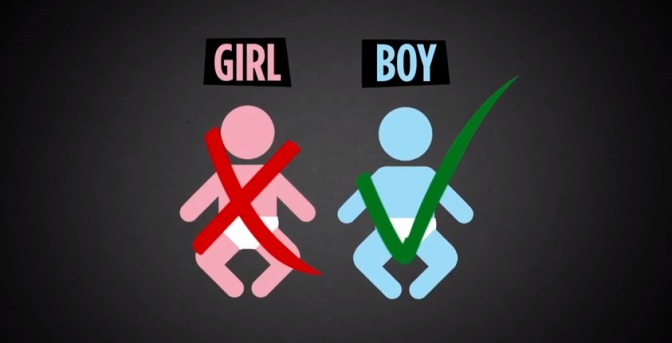Currently, PRENDA (the Prenatal Nondiscrimination Act) has been introduced to the Senate and is now in committee. The bill would ban abortions that are done on the grounds of race or sex. It is particularly aimed at preventing sex-selection abortions, in which a couple wanting a boy, for example, aborts a baby girl.
With all the rhetoric from pro-abortion people about the bill, I am reminded of a 2012 Slate article. In the article, pro-abortion writer Allison Benedikt cautions fellow pro-choicers not to be swayed by qualms about sex-selection abortions. She argues that being pro-choice means accepting every possible reason given for an abortion, no matter how trivial it seems. And while I would never argue that most women abort for trivial reasons, there have been women who have aborted in order to go on a vacation, in order to preserve a tummy tuck, and to be thin enough to look good in a wedding dress.
I found this bit interesting:
…[L]et’s just remember that we are talking about fetuses. No matter how many ultrasound pics get posted to Facebook, these are fetuses with female genitals or male genitals—not little girls and little boys. If pro-choicers object to aborting because of the sex of the fetus, aren’t we then saying that abortion is “murdering” girls? Aren’t we basically arguing that a fetus is not a blank slate but a future possibility? That is not the case to make if your goal is to protect abortion rights. Gulp for a second if you must, then get over it.
Benedikt knows that the concept of aborting baby girls because they are girls makes feminists uncomfortable. To get past this, she resorts to dehumanizing preborn babies. Using the term “fetus” as a dehumanizing, derogatory term, she claims that fetuses are not people. They may look like people. They may have all the parts people have. They may have the same type of DNA as people. They may have two people as parents. They may have a heartbeat, a circulatory system, a blood type different from the mother, a brain, even a gender – just like people do. But they are not people. She gives no arguments as to why they are not people. She just asserts it.
Dehumanization of preborn babies is common in the pro-abortion camp, and this is only one (although a very blatant) example. But what exactly makes a human “fetus” not a person? In law, a nonhuman, nonperson, disposable fetus becomes a person with inalienable rights when he or she is completely outside of her mother, when she is born.
It raises the following questions. What is she when she is partially born? Can we choose a percentage based on her position and how much of her body is outside the birth canal – 25% of a person, 50%, 75%? Is it required that the umbilical cord be cut? What if just a toe is inside the mother? In fetal surgery, the fetus is sometimes lifted from the woman’s body to be operated on and then lowered back inside. Does she become a person during the operation, when she is outside the womb, and then become, once again, a nonperson after she is replaced?
In no sane, logical world is someone’s humanity determined by where they are located. By logical extension, can we say that I am not a person at home, but when I walk out my front door I suddenly become a person? There is no rational argument that can support the belief that a baby two seconds before birth is not a person but a baby two seconds after birth is.
The reason why Benedikt argues that preborn “fetuses” are not people is simple. It is the same reason why slave-owners argued that slaves were not people. (And, in fact, on July 12 of 1707, slaves were ruled to be three fifths of a person in the Constitution.) The preborn “fetus” is not a person because pro-choicers don’t want her to be.
They don’t want to believe that preborn babies are people, any more than slave-owners wanted to believe that slaves were people – because of expediency. It is useful for both slave-owners and those promoting abortion to declare that some people are not people. If slaves were acknowledged as people, they would have had to set them free. If fetuses were acknowledged as people, they couldn’t arbitrarily be killed.
It all comes down to expediency.
Benedikt tells pro-choicers troubled by their consciences that killing baby girls for being girls is okay. Because they are not really girls. Pro-lifers should rightly, and always, reject this “reasoning” – if one can even call it that.








